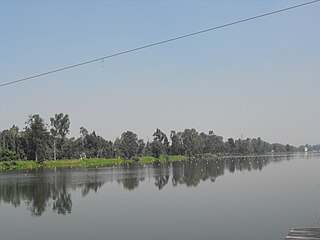
New Zealand at the 1968 Summer Olympics was represented by a team of 52 competitors, 47 men and five women, who took part in 26 events across eight sports. Selection of the team for the Games in Mexico City, Mexico, was the responsibility of the New Zealand Olympic and British Commonwealth Games Association. New Zealand's flagbearer at the opening ceremony was Don Oliver. The New Zealand team finished 27th on the medal table, winning a total of three medals, one of which was gold.

Dudley Leonard Storey was a New Zealand rower who won two Olympic medals.

Ross Hounsell Collinge is a former New Zealand rower who won two Olympic medals.
Warren Joseph Cole was a New Zealand rower who won an Olympic gold medal at the 1968 Summer Olympics in Mexico City.
Simon Charles Dickie was a New Zealand rowing cox who won three Olympic medals.
Anthony John Hurt is a former New Zealand rower who won two Olympic medals. At the 1972 Summer Olympics in Munich, he teamed with Dick Joyce, Wybo Veldman, John Hunter, Lindsay Wilson, Joe Earl, Trevor Coker and Gary Robertson and Simon Dickie (cox) to win the gold medal in the eights. At the 1976 Summer Olympics in Montreal, he again crewed the eight which this time won the bronze medal. His crewmates this time were Alec McLean, Ivan Sutherland, Trevor Coker, Peter Dignan, Lindsay Wilson, Joe Earl and Dave Rodger and Simon Dickie (cox). In both Olympic races, he was the stroke.
Lindsay Edward "Lew" Wilson is a former New Zealand rower who won two Olympic medals.
Athol John "Joe" Earl is a former New Zealand rower who won two Olympic medals.
Trevor Ian Coker was a New Zealand rower who won two Olympic medals. He was born in Whanganui, New Zealand. Coker won the European Championship in 1971. Known then as the "New Zealand Eight", Coker and his team received Halberg Awards in 1971 and 1972 as New Zealand Sportsman of the Year.
Gerard Wybo Veldman, known as Wybo Veldman, is a former New Zealand rower. Born in Padang, Indonesia, of Dutch parents, he won an Olympic gold medal at the 1972 Summer Olympics in Munich. He teamed with Dick Joyce, Tony Hurt, John Hunter, Lindsay Wilson, Joe Earl, Trevor Coker and Gary Robertson and Simon Dickie (cox) to win the gold medal in the eights. Veldman had previously been in the crew of the eight that finished fourth at the 1968 Summer Olympics in Mexico City. Veldman won a then record 21 New Zealand national rowing titles.
John Andrew Hunter is a former New Zealand rower who won a gold Olympic medal in his career.
Gary David Robertson is a former New Zealand rower who won an Olympic gold medal at the 1972 Summer Olympics in Munich.
Andrew David Bird is a former New Zealand rowing cox who won an Olympic bronze medal at the 1988 Summer Olympics in Seoul.
Alistair Garth Dryden is a former New Zealand rower.
Robert Edward "Bob" Page was a New Zealand rowing cox.

The Wellington Rowing Club is a rowing club situated on Wellington Harbour, New Zealand. The current building, is classified as a "Category I" historic place by the New Zealand Historic Places Trust.

The men's coxed four competition at the 1968 Summer Olympics took place at Virgilio Uribe Rowing and Canoeing Course, Mexico City, Mexico. It was held from 13 to 19 October and was unexpectedly won by the team from New Zealand, which secured the country its first Olympic rowing gold medal. Thirteen teams from 13 nations attended the competition. East Germany earned its first medal in its debut in the event, taking silver. Switzerland took bronze, its first medal in the men's coxed four since 1952.
Russell Robertson, known as Rusty Robertson, was a New Zealand-born, world class rowing coach of New Zealand and later, Australian national representative rowing crews. He was the national rowing coach of New Zealand from 1967 to 1976, and the national coach of Australia from 1979 to 1984.

The 1972 New Zealand eight was a team of Olympic gold medallists in rowing from New Zealand, having previously won the 1971 European Rowing Championships. At the time, the eight was regarded as the blue ribbon class of rowing, and the sport still had amateur-status in New Zealand, unlike many other nations competing in rowing. After a disappointing Olympic performance at the 1968 Summer Olympics by the New Zealand eight, national selectors Rusty Robertson, Don Rowlands, and Fred Strachan were tasked with assembling a new crew. Robertson was also the team's coach. The next time a New Zealand eight competed was at the 1970 World Rowing Championships, where they came third. The team was once again significantly changed for the next rowing season, with the 1971 edition of the European Rowing Championships and other international regattas beforehand seen as the ultimate test for the 1972 Summer Olympics. The team put up an impressive performance, beat the highly favoured East German eight, and became European champion; at the time the win was regarded as holding world championship status. No further changes were made to the team, not even their seating position, for the 1972 season. Despite a shoe-string budget, financial constraints, and all rowers working part-time, the 1971 success was repeated and the team won Olympic gold in Munich. The president of the International Olympic Committee (IOC), Avery Brundage, was a zealous advocate of amateurism; he was so impressed by the New Zealand performance that he insisted on handing out the gold medals himself. During the medal ceremony, much to almost everybody's surprise, "God Defend New Zealand" was played instead of the national anthem, "God Save the Queen". It was the impetus for a campaign to make "God Defend New Zealand" the New Zealand anthem, and in 1977 it was gazetted as having equal status to the traditional anthem.





